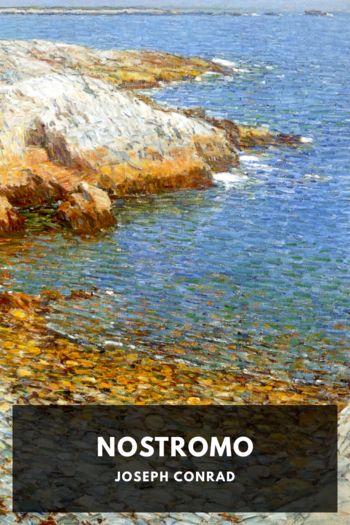Nostromo - Joseph Conrad (books to read fiction .TXT) 📗

- Author: Joseph Conrad
Book online «Nostromo - Joseph Conrad (books to read fiction .TXT) 📗». Author Joseph Conrad
“No end of them,” said Mr. Gould, marvelling inwardly at the mobility of her physiognomy. “All over the country. He’s famous for that sort of munificence.” “Oh, he didn’t boast,” Mrs. Gould declared, scrupulously. “I believe he’s really a good man, but so stupid! A poor chulo who offers a little silver arm or leg to thank his god for a cure is as rational and more touching.”
“He’s at the head of immense silver and iron interests,” Charles Gould observed.
“Ah, yes! The religion of silver and iron. He’s a very civil man, though he looked awfully solemn when he first saw the Madonna on the staircase, who’s only wood and paint; but he said nothing to me. My dear Charley, I heard those men talk among themselves. Can it be that they really wish to become, for an immense consideration, drawers of water and hewers of wood to all the countries and nations of the earth?”
“A man must work to some end,” Charles Gould said, vaguely.
Mrs. Gould, frowning, surveyed him from head to foot. With his riding breeches, leather leggings (an article of apparel never before seen in Costaguana), a Norfolk coat of grey flannel, and those great flaming moustaches, he suggested an officer of cavalry turned gentleman farmer. This combination was gratifying to Mrs. Gould’s tastes. “How thin the poor boy is!” she thought. “He overworks himself.” But there was no denying that his fine-drawn, keen red face, and his whole, long-limbed, lank person had an air of breeding and distinction. And Mrs. Gould relented.
“I only wondered what you felt,” she murmured, gently.
During the last few days, as it happened, Charles Gould had been kept too busy thinking twice before he spoke to have paid much attention to the state of his feelings. But theirs was a successful match, and he had no difficulty in finding his answer.
“The best of my feelings are in your keeping, my dear,” he said, lightly; and there was so much truth in that obscure phrase that he experienced towards her at the moment a great increase of gratitude and tenderness.
Mrs. Gould, however, did not seem to find this answer in the least obscure. She brightened up delicately; already he had changed his tone.
“But there are facts. The worth of the mine—as a mine—is beyond doubt. It shall make us very wealthy. The mere working of it is a matter of technical knowledge, which I have—which ten thousand other men in the world have. But its safety, its continued existence as an enterprise, giving a return to men—to strangers, comparative strangers—who invest money in it, is left altogether in my hands. I have inspired confidence in a man of wealth and position. You seem to think this perfectly natural—do you? Well, I don’t know. I don’t know why I have; but it is a fact. This fact makes everything possible, because without it I would never have thought of disregarding my father’s wishes. I would never have disposed of the Concession as a speculator disposes of a valuable right to a company—for cash and shares, to grow rich eventually if possible, but at any rate to put some money at once in his pocket. No. Even if it had been feasible—which I doubt—I would not have done so. Poor father did not understand. He was afraid I would hang on to the ruinous thing, waiting for just some such chance, and waste my life miserably. That was the true sense of his prohibition, which we have deliberately set aside.”
They were walking up and down the corredor. Her head just reached to his shoulder. His arm, extended downwards, was about her waist. His spurs jingled slightly.
“He had not seen me for ten years. He did not know me. He parted from me for my sake, and he would never let me come back. He was always talking in his letters of leaving Costaguana, of abandoning everything and making his escape. But he was too valuable a prey. They would have thrown him into one of their prisons at the first suspicion.”
His spurred feet clinked slowly. He was bending over his wife as they walked. The big parrot, turning its head askew, followed their pacing figures with a round, unblinking eye.
“He was a lonely man. Ever since I was ten years old he used to talk to me as if I had been grown up. When I was in Europe he wrote to me every month. Ten, twelve pages every month of my life for ten years. And, after all, he did not know me! Just think of it—ten whole years away; the years I was growing up into a man. He could not know me. Do you think he could?”
Mrs. Gould shook her head negatively; which was just what her husband had expected from the strength of the argument. But she shook her head negatively only because she thought that no one could know her Charles—really know him for what he was but herself. The thing was obvious. It could be felt. It required no argument. And poor Mr. Gould, senior, who had died too soon to ever hear of their engagement, remained too shadowy a figure for her to be credited with knowledge of any sort whatever.
“No, he did not understand. In my view this mine could never have been a thing to sell. Never! After all his misery I simply could not have touched it for money alone,” Charles Gould pursued: and she pressed her head to his shoulder approvingly.
These two young people remembered the life which had ended wretchedly just when their own lives had come together in that





Comments (0)